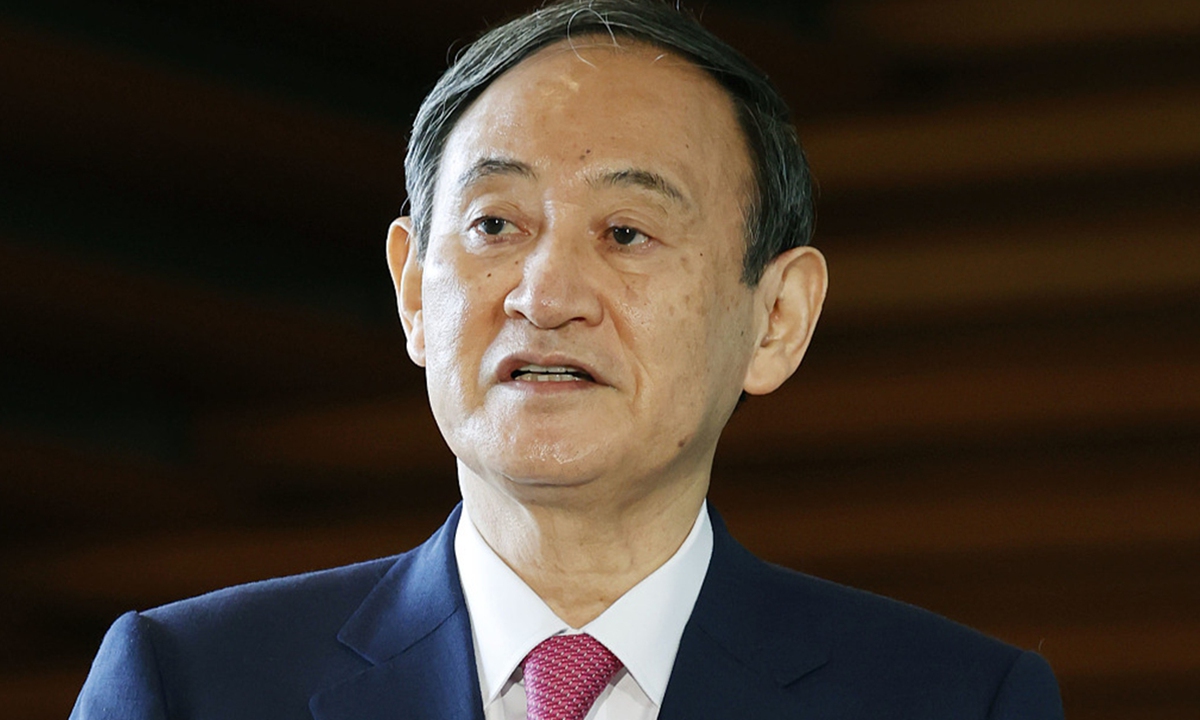Suga’s speech shows Japan’s willingness to work with China
By Chen Yang Source: Global Times Published: 2020/10/27 18:23:41

Japanese Prime Minister Suga Yoshihide Photo:VCG
Japanese Prime Minister Yoshihide Suga delivered his first policy speech in the Diet Monday afternoon. In his address, Suga said that a stable relationship between China and Japan is essential and that he hopes to cooperate with China on common issues. Based on Suga's remarks, it's expected that the Suga administration will continue to promote the stable development of China-Japan relations and cooperation between the two countries for the foreseeable future.
According to Japan's post-WWII era political traditions, a Japanese prime minister usually delivers the policy speech at the outset of the parliamentary session. The purpose is to introduce and elaborate upon future policies and key agendas. The prime minister also takes questions from members of parliament and representatives of different parties.
Whereas the policy speech covers many fields such as politics, economics and diplomacy, it in fact outlines a general direction that the Japanese government will take.
Suga, in his first policy speech, has clearly shown a mild attitude toward China. It's expected the Japanese government in the coming period will continue to deepen relations with China.
Japan has recently made some rhetoric and moves which are not conductive for the positive development of China-Japan relations. But they do not represent the whole picture of the Suga administration's China policy.
Foreign ministers from members of the Quad, an informal security grouping of the US, Japan, Australia and India, met in Tokyo on October 6, and discussed Indo-Pacific regional security issues. Many media outlets said it mainly targeted China's so-called ascending military aggression.
When Suga paid his first official overseas visit to Vietnam and Indonesia from October 18 to 21, he said that Japan opposes any actions that escalate tensions in the South China Sea. Tokyo agreed with Hanoi and Jakarta to step up their bilateral defense cooperation. On October 19, Japanese Defense Minister Nobuo Kishi met his Australian counterpart Linda Reynolds. Kishi said, "to maintain and enhance a free and open Indo-Pacific, we [Japan and Australia] will increase our countries' cooperation and interaction." The released joint statement stated that the ministers, "reinforced their strong opposition to any attempts to unilaterally change the status quo by coercion" in the East and South China seas. Kishi also said in a video message that China is greatly raising the quality and quantity of its military power, rapidly and without transparency, according to a Nikkei report on Saturday.
Based on the series of actions made by the Japanese side, some analysts believe that the Suga administration would take a hard-line China policy. It is noticeable that when Suga expressed his concern over the South China Sea, he did not name China per se. Kishi's words against China cannot represent the stance of Japanese government's China policy. With Japan's economy gravely hit by the novel coronavirus epidemic, the importance of China outweighs that of the US.
According to statistics released by the Japanese Ministry of Finance, from April to September in 2020, Japan's exports dropped by 19.2 percent, but the figure for its exports to China saw a rise of 3.5 percent, according to reports. Japan's exports to China have witnessed a positive growth for three consecutive months since July. Reports also show that China has exceeded the US, becoming Japan's largest export destination, from April to September. Given that Suga's policy speech emphasized on preventing and curbing the epidemic, and reviving the economy, it can be concluded that the Suga administration hopes to deepen the development of China-Japan relations, in a bid to revitalize Japan's economy.
In his address, Suga clearly announced that Japan would achieve net zero greenhouse gas emissions by 2050. Not long ago, Chinese President Xi Jinping said at the general debate of the 75th session of the General Assembly that China was striving to become carbon neutral by 2060.
Both the Chinese and Japanese governments have stressed that they will work hard to reduce carbon emissions, meaning that the economy and society will be transformed toward green and low-carbon development. This can become a new starting point for cooperation between the two countries.
For example, China and Japan can strengthen cooperation with hydrogen energy research and development. Japan started earlier than China in this field, and has accumulated some useful experience. In this respect, China can learn to develop hydrogen energy in line with its own national conditions.
With the coming of the "post-pandemic age," cooperation between the two countries in traditional sectors such as trade and economics may only be conducive to their mutual development. But collaboration on international issues, such as reducing carbon emissions and cooperating on green energy, can deepen mutual political trust between the two. It can also make important contributions to global climate change responses.
The author is a media professional and a Beijing-based Japan watcher. opinion@globaltimes.com.cn
RELATED ARTICLES:
Posted in: VIEWPOINT,ASIAN REVIEW,OTHER REGIONS